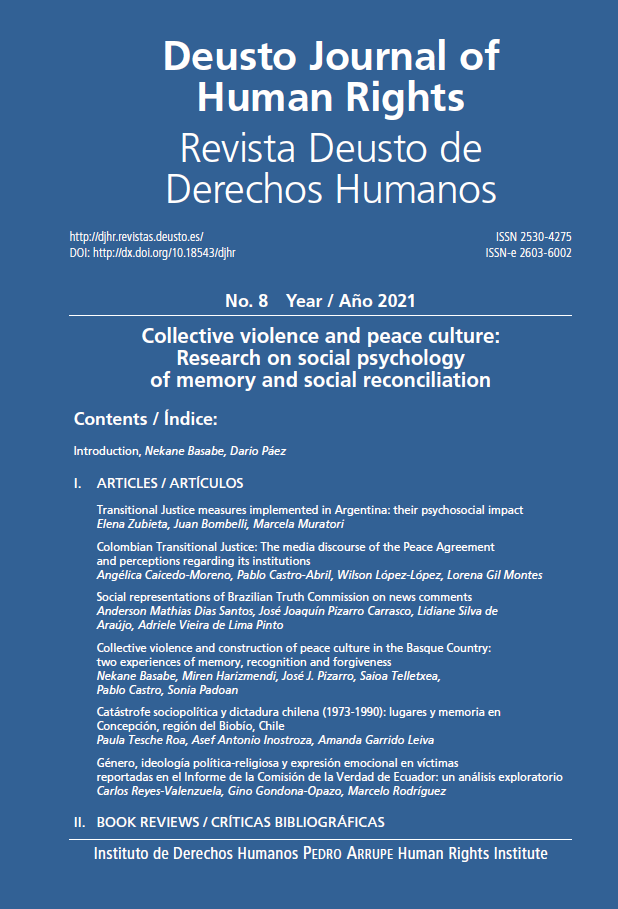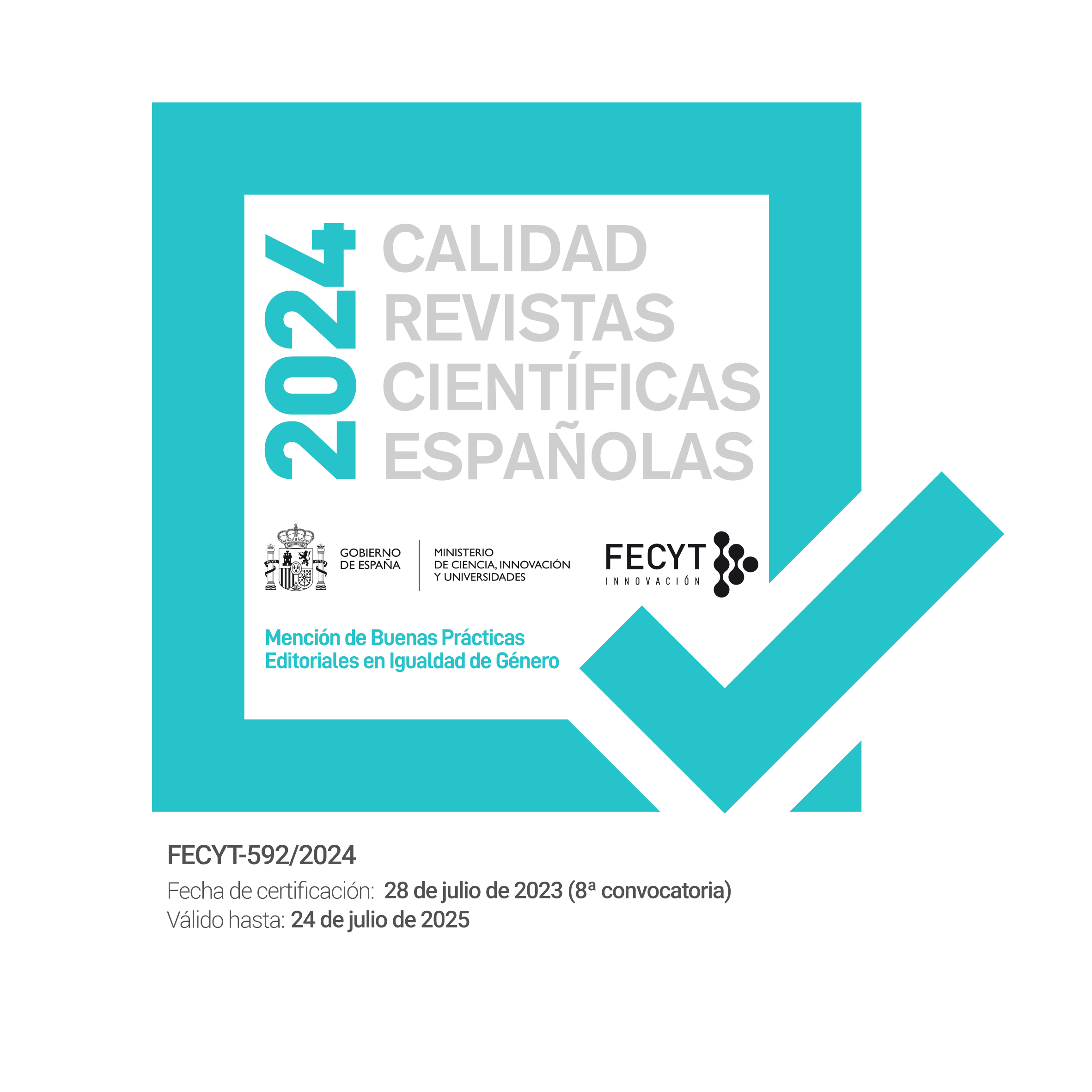Medidas de Justicia Transicional implementadas en Argentina, su impacto psicosocial
Resumen
El terrorismo de Estado es el más ignominioso porque los poderes y recursos de un país se utilizan para generar terror y obtener ciertos objetivos políticos en lugar de estar al servicio de la ciudadanía. La Justicia Transicional (JT) incluye debates sobre la democratización, los derechos humanos y la reconstrucción del Estado post períodos de extrema conflictividad social. Finalizada la dictadura militar (1976-1983) en Argentina, se implementaron mecanismos de JT para afrontar las consecuencias de la violencia colectiva estatal: Comisión de Verdad, procesos penales, reformas institucionales y gestos reparadores. Se desarrolló un estudio descriptivocorrelacional, de diferencias de grupo, diseño transversal no experimental, con el objetivo de analizar el impacto psicosocial de las medidas de JT, en base a una muestra intencional compuesta por 576 participantes. Los hallazgos respaldan la efectividad de las medidas combinadas de JT, la debilidad del reconocimiento y las disculpas, y diferencias en términos de afectación de la violencia.
Recibido: 20 septiembre 2021
Aceptado: 25 noviembre 2021
Descargas
Citas
Andrieu, Kora. 2009. «´Sorry for the Genocide´. How public apologies can help promote national reconciliation.» Millenium: Journal of International Studies 38, no. 1: 3-23.
Andrieu, Kora. 2010. «Transitional justice: A new discipline in Human Rights.» Online Encyclopedia of Mass Violence. Accessed February 4, 2013 http://www.massviolence.org/PdfVersion?id_article=539.
Arnoso, Maitane, Juan I. Bombelli, Marcela Muratori, Silvia Mele, & Elena Zubieta. 2013. «La CONADEP y el Informe “Nunca Más”: Conocimiento, eficacia y emociones asociadas.» Anuario de Investigaciones XX: 197-205.
Arnoso, Maitane, & Silvia Da Costa. 2015. «Actitudes hacia el pasado de violencia colectiva y actividades de Justicia Transicional en Uruguay.» Psicologia Política, 15, no. 32: 185-201.
Arnoso, Maitane, Marcela Muratori, Juan I. Bombelli, & Elena Zubieta. 2017. «Evaluación de medidas retributivas y restaurativas luego de pasados políticos traumáticos: una mirada al caso argentino.» Cuadernos FHyCS – UNJu 52: 211-233.
Avruch, Kevin. 2010. «Truth and reconciliation commissions: problems in transitional justice and the reconstruction of identity.» Transcultural Psychiatry 47, no. 1: 33-49. Doi: https://doi.org/10.1177/1363461510362043
Bakiner, Onur. 2014. «Truth Commission Impact: An Assessment of How Commissions Influence Politics and Society.» International Journal of Transitional Justice 8, no 1: 6-30.
Balza, Martín. 1995. Mensaje al país. Accessed in http://www.desaparecidos.org/nuncamas/web/document/militar/balza95.htm
Blatz, Craig W., Karina Schumann, & Michael Ross. 2009. «Government apologies for historical injustices.» Political Psychology 30, no. 2: 219-241.
Bobowik, Magdalena, Darío Páez, Maitane Arnoso, Manuel Cárdenas, Bernard Rimé, Elena Zubieta, & Marcela Muratori. 2017. «Institutional apologies and socioemotional climate in the South American context.» British Journal of Social Psychology 56, no. 3: 578-598.
Calcagno, Jorge L. 2013. La construcción de la democracia: Raúl Alfonsín y los militares. Buenos Aires: Corregidor.
Canelo, Paula. 2010. «La convicción y la responsabilidad: La interna militar en torno a las ‘autocríticas’ del general Balza durante los años noventa en la Argentina.» VI Jornadas de Sociología de la UNLP, December 9 and 10 2010, La Plata, Argentina.
CONADEP. 1984. Comisión Nacional sobre la Desaparición de Personas. Informe Nunca Más. Buenos Aires: EUDEBA.
Crenzel, Emilio. 2010. «Políticas de la memoria. La historia del informe Nunca Más.» Papeles del CEIC 61, no. 2: 1-31.
Drožd̄ek, Boris. 2010. «How do we salve our wounds? Intercultural perspectives on individual and collective strategies of making peace with own past.» Traumatology 16, no. 4: 5-16. doi: https://doi.org/10.1177/1534765610362800
Echebarria, Agustín, & Darío Páez. 1989. Emociones: perspectivas psicosociales. Madrid: Fundamentos.
Etxebarría, Itziar, Darío Páez, José Valencia, María A. Bilbao, & Elena Zubieta. 2010. «Efectos de rituales de expiación y glorificación de la Iglesia sobre la guerra civil española.» Revista de Psicología 28, no. 1: 37-80.
Gabisirege, Simon, & Stella Babalola. 2001. Perceptions about the Gacaca Law in Rwanda: Evidence from a multi-method study. Baltimore: Johns Hopkins University School of Public Health, Center for Communication Programs.
Gibson, James L. 2004. Overcoming Apartheid: Can truth reconcile a divided Nation? New York: Russell Sage Foundation.
Greiff, Pablo de. 2008. «Justicia y Reparaciones.» In Reparaciones para las víctimas de violencia política: estudios de caso y análisis comparado, edited by Catalina Díaz, 407-440. Bogotá: ICTJ.
Greiff, Pablo de. 2011. «Algunas reflexiones acerca del desarrollo de la Justicia Transicional.» Anuario de Derechos Humanos 7: 17-39. doi: https://doi.org/10.5354/0718-2279.2011.16994
Greiff, Pablo de. 2012. «Teorizar la justicia transicional.» American Society for Political and Legal Philosophy 51: 31-77.
Greiff, Pablo de. 2014. «Transitional Justice and development.» In International Development: Ideas, Experience, and Prospects, edited by Bruce Currie- Adler, Ravi Kanbur, David M. Malone, & Rohinton Medhora, 412-427. Oxford: Oxford University Press.
Hayner, Priscilla. 1994. «Fifteen Truth Commissions–1974 to 1994: A comparative study.» Human Rights Quarterly 16, no. 4: 597-655.
James, Matt. 2008. «Wrestling with the past: Apologies, quasi-apologies, and non-apologies in Canada.» In The age of apology: Facing up to the past, edited by Mark Gibney, Rhoda E. Howard-Hassmann, Jean-Marc Coicaud, & Niklaus Steiner, 137-153. Philadelphia: University of Pennsylvania Press.
Janoff-Bulman, Ronnie. 1992. Shattered assumptions: towards a new psychology of trauma. New York: Free Press.
Lira, Elizabeth, & María I. Castillo. 1991. Psicología de la amenaza política y del miedo. Santiago de Chile: CERSOC.
Lundy, Patricia, & Mark McGovern. 2008. «Whose justice? Rethinking transitional justice from the bottom up.» Journal of Law and Society 35, no. 2: 265-292.
Manzi, Jorge, & Roberto González. 2007. «Forgiveness and reparation in Chile: The role of cognitive and emotional intergroup antecedents.» Peace and Conflict 13, no. 1: 71-91.
Martín-Baró, Ignacio. 2003. Poder, ideología y violencia. Madrid: Trotta. McEvoy, Kieran. (2007). «Beyond Legalism: Towards a thicker understanding
of transitional justice.» Journal of Law and Society 34, no. 4: 411-440. Muratori, Marcela, & Elena Zubieta. 2013. «Miedo al delito y victimización
como factores influyentes en la percepción del contexto social y clima emocional.» Boletín de Psicología, 109: 7-18.
Páez, Darío. 2010. «Official or political apologies and improvement of intergroup relations: a neo-Durkheimian approach to official apologies as rituals.» Revista de Psicología Social 25, no. 1: 101-115.
Páez, Darío, Nekane Basabe, & José L. González. 1997. «Social processes and collective memory: A cross-cultural approach to remembering political events.» In Collective memory of political events: Social psychological perspectives, edited by James W. Pennebaker, Darío Páez, & Bernard Rimé, 147-174. Hillsdale, NJ: Lawrence Erlbaum.
Páez, Darío, & James Liu. 2011. «Collective Memory of Conflicts.» In Intergroup conflicts and their resolution: Social Psychological Perspective, edited by Daniel Bar-Tal, 105-124. New York: Psychology Press.
Reyes, Carlos, Gino Grondona, & Marcelo Rodríguez. 2015. «Evaluación del impacto de la Comisión de la Verdad en Ecuador: aportes psicosociales en la actual discusión sobre la reparación a las víctimas.» Psicología Política 15, no. 32: 119-136.
Rivera, Joseph de. 1992. «Emotional climate: Social structure and emotional dynamics.» International Review of Studies on Emotion 2: 197-218.
Rivera, Joseph de. 2014. «Culturas de Paz y el clima emocional en las sociedades.» In Psicología social y política: procesos teóricos y estudios aplicados, edited by Elena Zubieta, José F. Valencia, & Gisela Delfino, 159- 178. Buenos Aires: Eudeba.
Robben, Antonius C. 2005. «How traumatized societies remember: The aftermath of Argentina’s dirty war.» Cultural Critique 59, no. 1: 120-164.
Salvi, Valentina. 2012. De vencedores a víctimas: memorias militares sobre el pasado reciente en la Argentina. Buenos Aires: Biblos.
Salvi, Valentina. 2015. «Guerra, subversivos y muertos. Un estudio sobre las declaraciones de militares en el primer año de democracia.» In Democracia, hora cero. Actores, políticas y debates en los inicios de la postdictadura, edited by Claudia Feld, & Marina Franco, 153-193. Buenos Aires: Fondo de Cultura Económica.
Schey, Peter, Shelton, Dinah, & Naomi Roth-Arriaza. 1997. «Addressing Human Rights Abuses: Truth Commissions and the Value of Amnesty.» Whittier Law Review 19: 325-344.
Stein, Dan J., Soraya Seedat, Debra Kaminer, Hashim Moomal, Allen Herman, John Sonnega, & David R. Williams. 2008. «The impact of the Truth and Reconciliation Commission on psychological distress and forgiveness in
South Africa.» Social Psychiatry and Psychiatric Epidemiology 43: 462-468. doi: https://doi.org/10.1007/s00127-008-0350-0
United Nations (2004). Reporte del SecretarioGeneral, el Estado de Derecho y la Justicia Transicional en las sociedades en conflicto y postconflicto. August 3rd 2004, UN Doc S/2004/616.
Zubieta, Elena, Juan I. Bombelli, & Marcela Muratori. 2015. «Argentina: el impacto de la implementación de medidas de Justicia Transicional post Dictadura.» Psicología Política 15, no. 32: 101-118.
Zubieta, Elena, Gisela Delfino, & Omar Fernández. 2008. «Clima social emocional, confianza en las instituciones y percepción de problemas sociales. Un estudio con estudiantes universitarios urbanos argentinos.» Psykhe 17, no. 1: 5-16.
Deusto Journal of Human Rights / Revista Deusto de Derechos Humanos es una revista de Acceso Abierto; lo que significa que es de libre acceso en su integridad inmediatamente después de la publicación de cada número. Se permite su lectura, la búsqueda, descarga, distribución y reutilización en cualquier tipo de soporte sólo para fines no comerciales y según lo previsto por la ley; sin la previa autorización de la Editorial (Universidad de Deusto) o la persona autora, siempre que la obra original sea debidamente citada (número, año, páginas y DOI si procede) y cualquier cambio en el original esté claramente indicado. Cualquier otro uso de su contenido en cualquier medio o formato, ahora conocido o desarrollado en el futuro, requiere el permiso previo por escrito de la persona titular de los derechos de autoría.



3.jpg)
3.jpg)
3.jpg)
.jpg)








